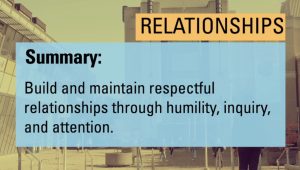Chapter 7: Respectful Relationships
Respectful relationships, the first of our six principles to guide community-engaged collaboration, are particularly important. This is considered a foundational principle, from which the other community-engaged principles and community-engaged teaching flow.
Respectful relationships refer to the centrality of relationships in our community interactions. We cannot have a community without relationships since relationships are the connections that build and constitute a community. A successful partnership must be built on trust and respectful relationships guided by integrity. In practice, this means that community-engaged participants, students, faculty and community partners need to take the time to get to know each other before launching into projects. It means that participants must prioritize building and sustaining relationships with people and organizations that extend beyond specific collaborations. This means talking to each other and getting to know each other’s capacities, limitations, and hopes for the project well in advance of the project’s beginning. Relationships are the foundation from which we can build reciprocal and equitable partnerships with care and attention to continuity with both openness and learning and a commitment to act.
Abigail talks about what Respectful Relationships means to her in this short video clip (access to closed captions in toolbar):
Watch the whole 27-minute video, “The Principles of Community Engagement Module” [27:38] (access to closed captions in toolbar):

Checklist: Respectful Relationships
Here are some questions you might ask yourself when considering the principle of respectful relationships in your community engaged learning experience:
- Have I taken the time to understand this community by reviewing publicly-available materials prior to engaging the community partner? How?
- Am I listening actively to community partners? How?
- Have I been open and honest with my community partner about my skills, limitations, and the amount of time and energy I can devote to this project?

